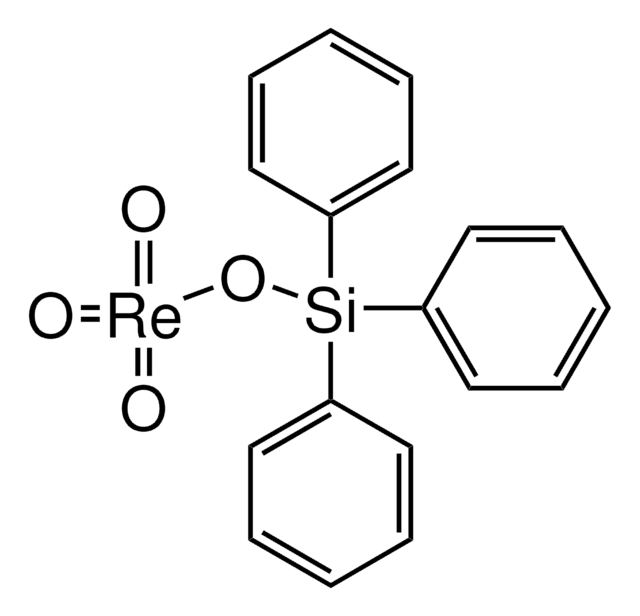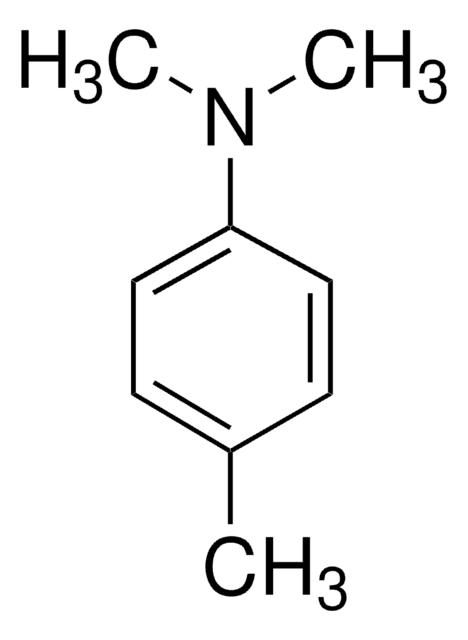412910
Methyltrioxorhenium(VII)
Re 71.0-76.0 %
Synonym(s):
MTO, Methylrhenium(VII) trioxide
Sign Into View Organizational & Contract Pricing
All Photos(2)
About This Item
Linear Formula:
CH3ReO3
CAS Number:
Molecular Weight:
249.24
Beilstein:
3927932
MDL number:
UNSPSC Code:
12161600
PubChem Substance ID:
NACRES:
NA.22
Recommended Products
form
solid
Quality Level
composition
Re, 71.0-76.0%
reaction suitability
core: rhenium
reagent type: catalyst
mp
111 °C (lit.)
SMILES string
C[Re](=O)(=O)=O
InChI
1S/CH3.3O.Re/h1H3;;;;
InChI key
PQTLALPZRPFYIT-UHFFFAOYSA-N
Looking for similar products? Visit Product Comparison Guide
Application
Potent catalytic oxidant for converting alkenes to epoxides in a variety of solvents and 2-methylnaphthalene to 2-methyl-1,4-naphthoquinone (Vitamin K3).
Catalytic oxidant used with urea hydrogen peroxide in an efficient conversion of imines to nitrones.
An effective antioxidant under various conditions.
Catalytic oxidant used with urea hydrogen peroxide in an efficient conversion of imines to nitrones.
An effective antioxidant under various conditions.
Storage Class Code
11 - Combustible Solids
WGK
WGK 3
Flash Point(F)
Not applicable
Flash Point(C)
Not applicable
Personal Protective Equipment
dust mask type N95 (US), Eyeshields, Gloves
Choose from one of the most recent versions:
Already Own This Product?
Find documentation for the products that you have recently purchased in the Document Library.
Customers Also Viewed
R Pasquariello et al.
Theriogenology, 145, 77-85 (2020-02-01)
Developmental competence determines the oocyte capacity to support initial embryo growth, but the molecular mechanisms underlying this phenomenon are still ill-defined. Changes in microRNA (miRNA) expression pattern have been described during follicular growth in several species. Therefore, aim of this
Anna Fitzpatrick et al.
Journal of sports sciences, 35(22), 2204-2210 (2016-12-03)
The Lawn Tennis Association's mini tennis (MT) is a modified version of tennis consisting of progressive stages; however, there have been few attempts to evaluate how MT might shape performance behaviours. Here, we examine effects of playing MT on the
Christina Janko et al.
International journal of molecular sciences, 14(4), 7341-7355 (2013-04-04)
Magnetic drug targeting (MDT) improves the integrity of healthy tissues and cells during treatment with cytotoxic drugs. An anticancer drug is bound to superparamagnetic iron oxide nanoparticles (SPION), injected into the vascular supply of the tumor and directed into the
Aldrichimica Acta, 28, 55-55 (1995)
Applied Homogeneous Catalysis with Organometallic Compounds, 3, 1304-1304 (2002)
Our team of scientists has experience in all areas of research including Life Science, Material Science, Chemical Synthesis, Chromatography, Analytical and many others.
Contact Technical Service















